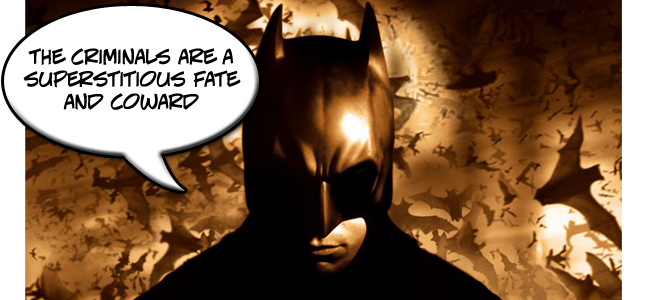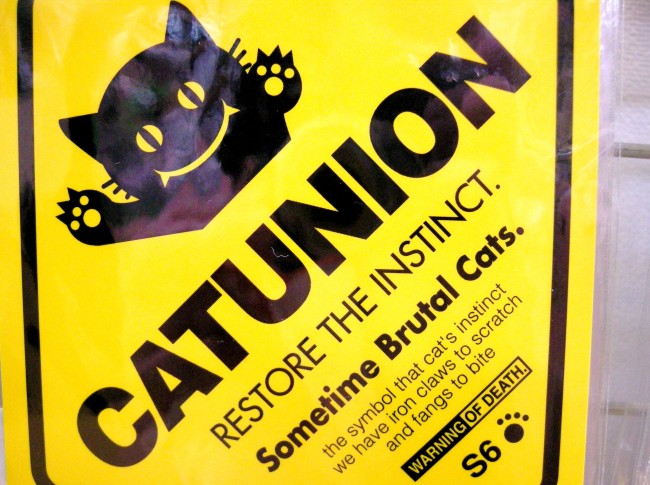![]()
Imagine this: Our handsome hero has located the hostages of a terrorist cell. Slumped in their cage, the prisoners await their execution. Our hero, trying to give them hope slips a piece of paper into their cell as he runs past, on his way to the command center. One of the prisoners finds the note and opens it. In it is a simple message:
“I am can have you outside”
Wait, what? Why would he write that? Is this guy an idiot? How is that supposed to give the prisoners hope? Is he trying to torture them further by confusing them? Was that actually some weird sexual proposition? No, it’s just that the writer didn’t take the time to translate the note properly.
I’m a pretty easygoing guy about most things, and I recognize that writing fiction is difficult but there is something about crappy translations that just fries my nuggets. And the more I think about it, the more justified I feel. So let’s take a moment and justify my rage.
What does including another language do for you?
Fiction is full of instances in which a character will utter a phrase in another language, meaning not in the primary language of the piece. A sweet nothing to a lover in French, an assurance in Spanish to a group of inner-city cheerleaders, a sharp order in German to some soldiers. But why? If one of the characters suddenly speaks in another language what is the writer trying to say about him?
The Character is Smart or Worldly:
It’s no mystery that being a polyglot makes a person seem smarter. Speaking multiple languages is one of those real-life superpowers that not everyone possesses; like being double-jointed or rolling your tongue into a taco-like structure. So showing a character that can casually switch back and forward between languages goes to show that he is intelligent. This also makes the character seem worldly, since they likely learned the language for, or as a result of, traveling the world. There’s also the hidden perk that having a character speak a different language also makes the author seems smarter. “Captain America is fluent in French… AND SO AM I!”
The Character is Definitely from that Country (or Region, I guess):
A character from Argentina will obviously speak Spanish, as well as regional indigenous languages, depending on characterization. So throwing in a phrase in Spanish legitimizes that character as a native speaker. This aids in establishing the character’s credentials as well as bringing any relevant tropes to the fore. And yes, that includes playing on any potential stereotypes.
The Character is Just Like You, Minority I’m Trying To Reach Out To:
Lastly, the fact that the character speaks fluent Amharic can be used to endear him to all your potential Ethiopian readers (Yes, this might be a bad example, but it actually reinforces my point.). This, essentially is the second part of the double whammy with the above point. Not only is the character way, totally from that region, legitimizing her to non-natives; she is also, clearly a native, making her accessible to people from that region. This, though, is usually the least likely reason, with the other two being more prevalent. More on that later.
And Then It All Goes to El Poo-poo Caca
So for one of these reasons, or maybe some other reason. The Author has (let’s say for the sake of argument) their protagonist utter a phrase in another language. However the phrase is somehow incorrect, if it’s a TV show or movie it may be mispronounced, if it is in print it may be misspelled, grammatically incorrect or just erroneous. What happens then to the themes the writer was trying to establish? Well, let’s go back through and look at each of the previous points.

The Character is Smart or Worldly:
Clearly not. In fact the error makes this theme entirely transparent. Instead of the Hero casually using another language, and being effortlessly erudite, he comes across as someone trying to seem cool, and failing at it. Of course the rest of the cast will still react as though the statement is correct, or hilariously enough, express awe at their mastery of language. This leaves you with a comical moment starring an idiot, and an even bigger idiot. There is a well known super-meme out there that capitalizes on the ignorance of one group about the language of another:
That’s right, Engrish! “whoever wrote that sign sure was smart!” “I wish I had such a command of English” and “This is not at all hilariously wrong” May be some of the things that go through your mind. But likely it’s just the opposite.
The Character is Definitely from that Country:
As consumers of media, we expect a certain level of subtlety from our comics, movies, and TV shows. When we see a traditionally mean character being nice we don’t assume they have changed personalities, we assume they’re up to something. Likewise when I, as a Spanish speaker see a character who is supposed to be from Mexico use broken Spanish any illusion that the character is actually from there shatters into a thousand mispronounced pieces.
The Character Is Just Like You, Minority I’m Trying To Reach Out To:
Earlier I pointed out that this one tends to be the least likely goal for the author, because presumably, if the company he works for wanted to tap the Tagalog audience, they would just produce the piece in Tagalog, right? However, even if the author doesn’t care about this dimension it doesn’t mean it’s not there, and a mistranslated phrase has the potential to turn this aspect of things into a racial issue. Clearly the writer doesn’t care enough about me, as a Cantonese speaker, to do any amount of research. This tells me that this book is for English speakers (in the U.S.) who wouldn’t know any better, and that if any stray Chinese people happened to read it, then who cares? This means that the author does not care for the linguistic minorities that might be reading their book, only throwing in a half-chewed phrase to make a character seem authentic, without actually doing any legwork. It’s the linguistic equivalent of a stereotype, (which I believe is simply called a linguistic stereotype). Needless to say, a poorly translated statement completely undermines the piece for any minorities who were looking to relate to it.

So right about this point you might be saying to yourself, “Boy, you sure are making a mountain out of a molehill, or some other quaint cliche,” but the fact of the matter is that this stuff is important. Language is a tool, like anything else, one that can be used to validate, elevate or oppress other people. It may not make a difference to you if you call someone a Pole or a Polack, but it makes a difference to that person. Likewise it may not make a difference to you whether Bane speaks middle-school spanish, but to a native speaker it absolutely makes a difference.
So, if there are any writers out there who have gotten this far here’s my advice to you: Next time you want to take a phrase in English and translate it into Spanish for use in fiction, don’t.
- Your friend Jeff who spent a summer in Cancun isn’t qualified to translate it, he only knows how to order beer.
- Bablefish, and other online services aren’t qualified to translate it, the images on this page were translated using those programs.
- Your friend Fernando who is a 4th generation American and only knows a little bit of Spanish is clearly not qualified to translate it.
- Your friend Josefina, who is a native speaker is not qualified to translate it, because if she doesn’t catch the context it may still be wrong.
So unless you’re willing to hire an actual professional translator, I recommend you just use those little <We are speaking Skrull now> symbols and write out your dialogue in english.
There, doesn’t everyone feel better now? I sure do.





20 Comments
Really awesome article! This is something that I know look at, and wonder about when reading a comic book. Something that has bugged me for years is whether or not Blue Beetle #26 is all in correct Spanish or not, even if the trade does have the English version of the script. Always find your articles to be among the most fascinating on the site, as always keep up the good work!
SOMEONE SET UP US THE BOMB!!!
You build a point excellent, Sir.
But this will not being the unique cheap trick that the improper writers use to give the illusory of the excellence. Star Trek technobabble has the same effect on the correct section of the hearing, and hatred truth when the current means try to imply to fandom of the comics book in their histories and to obtain to him all the “POW! BIFF! SOCKO!” badly.
In short, it’s a shortcut designed to trick the masses into the illusion of quality.
Working as a translator myself (English to French and a bit of vice-versa), I don’t remember seeing French written correctly in a Marvel or DC comic.
A classic (for me) is the JLE where Superman goes to France so they can use his heat vision to operate on Power girl. The French nurses go “C’est l’Homme de ferre!” (trying to say it’s the Man of steel)…should be “fer” (although I would’ve used “acier” personally…)…sounds stupid, but it threw me way off…
And in the same series, the French courses they take…not too great either. You would expect them to do a bit more research when trying to give a French course…not ask the bosses secretary who’s been to Paris once for 2 weeks to validate the translation…
Mokin’s opinion…
I just translated that using google translate and it says “It’s Iron Man!” lol
¡Oh, man!
Amazing article, Rodrigo. Congratulations from Spain. And is something that happens every single time: Bane, Blue Beetle, the “spaniards” from Lost, the cuban characters in Dexter, etc.
And Kirby, two examples from Blue Beetle #26.
One awful, in the cover “¡EL PARÁSITO DESTRAILLÓ!”. To this day I’ve been unable to find out what “destrailló” means.
Well, it’s not true. Means “unleash”, but is a real bad translation (Babel Fish), the correct form, in this case, should be “desatar”, not “destraillar”. And even admiting “destraillar”, the title should read “EL PARÁSITO DESTRAILLADO”. (Parasite unleashed).
Another more tolerable, but mistake after all, and very common in all the cases:
Page 13: “Soy el Parásito, y sé todo sobre tu y tu familia. Hasta el pequeño Milagro.”
The right one, in Spain: “Soy el Parásito, y lo sé todo sobre ti y tu familia. Incluso sobre la pequeña Milagro”. It’s all in the pronouns.
Apologies if my written english isn’t as good as it can be.
No, that’s great thank you. Always something I was leary about, because I have only taken 2 1/2 years of high school Spanish (So obviously not even in amateur leagues), I thought it would be awesome if it was all right or just terrible if it was all wrong.
Interesting article. Chapeau, good sir. ;)
I am also surprised that some wrong phrases (like some of Nightcrawler’s) have survived for such a long time. Obviously no-one over the course of the years has ever either bothered to write in to the editors or the publishers don’t care.
Rodrigo, you have to read Taskmaster #2, the main villain speaks in broken Spanish and I immediately assumed it was a case of bad translation but other Mexican characters spoke it perfectly and we later find out the character with the broken Spanish is actually not of latin origin, it was so satifying to find out they weren’t insulting the readers intelligence but setting up something instead.
Really good article, Rodrigo sir! Being a french speaking person myslef and also fluent in Italian, I have, like Mokin, not seen either wrote properly in comics.
Even Matthew is guily sometimes! I certainly remember him in one podcast naming a french guy Mr Boeuf la Tête, which can be litteraly translate as Mr Beefhead! It might be an obscur reference that I missed, but anyhow, it would be a strange name! :)
it is an obscure reference you missed, but don’t feel bad, no one expects you to absorb tv shows, movies and comedy routines the way Matthew has. He’s the Sham Wow of pop culture.
Even Matthew is guily sometimes! I certainly remember him in one podcast naming a french guy Mr Boeuf la Tête, which can be litteraly translate as Mr Beefhead! It might be an obscur reference that I missed, but anyhow, it would be a strange name!
Monsieur Boeuf la Tete is indeed an obscure reference. Anybody gonna earn their Bronze Blok award by figuring it out? (Otter Disaster and Yoyology are barred from this competition due to having roomed with me in the 90’s.)
Does that mean I can now understand why Cannonball and Rogue don’t speak proper “redneck”? Because let me tell ya’ll somethin’…they don’t. Of course, there’s such a glut on comic writers from the Southern U.S. that they should find someone to get the accent right, right? What? There are none? Ok…never mind…
Rodrigo,
I didn’t realize you knew Skrull!
Including another language in comics just pisses me off (pardon my French). I’m semi-literate in both English and French (plus several years of Latin), along with some conversational exposure to German, Spanish and Russian…so it’s not that I’m opposed to the concept of folks using languages other than American.
The trope that upsets me more than any other is the use of a simple substitution cypher for “alien speak”. I hate “Interlac” in every LSH appearance, I hate the 21st century Kryptonian, and I hated it in X-Statix. Again…I’m a fan of puzzles, crosswords and the like, but it makes me think that the creators actually don’t want me to enjoy reading their book.
A similar, but not quite the same, irritation of mine is where writers try to make characters speak with a ‘foreign’ accent, but get the dialects completely out of context.. i.e. You’ll often see a character presented as an english thug/peasant etc. who then starts speaking with a haughty posh accent which doesn’t fit at all.. I’ve also seen a single character using phrases from several different regions at the same time (i.e. starts off speaking like a cockney in one sentence, then sounds like one of the beatles in the next!). I guess english accents must all sound the same to americans? but i find it really jarring when writers get it wrong!
I feel that. I almost went into how in TV and movies they will have people from one latin american country play someone from another. IE a Mexican playing a Cuban, and of course the accent (even in English) is all wrong. But I figured I’d leave it alone because presumably they got any native speaker to play the part, which is a babystep in the right direction.
Being a french canadian, it’s rare that i’ve seen good french in a comic book! The one title that i read and frustrate me is The Boys with the frenchie guy! It’s so bad written even i sometime wonder what is it he’s trying to say because it’s translate by google or by people with a dictionnary dating before the depression! Although, what i liked is when a french canadian curse goes unnoticed by marvel or Dc, (especially Marvel) It makes me laugh, because they’re well written!
So was it Batman Inc. that got your irish up?
nah, I’m not even reading that noise